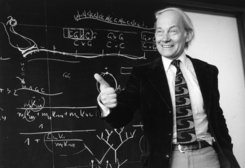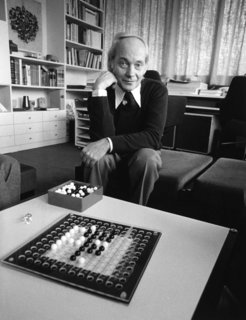Manfred Eigen – versatile scientist and visionary mind
Manfred Eigen had a great passion for science and has made fundamental contributions in widely differing research fields, for which he has been awarded numerous prizes and honorary doctorates. But until the age of 18, there was a serious alternative to science in his life: The future Nobel Laureate in Chemistry, born in Bochum on May 9, 1927, was faced with the choice of becoming a scientist or a pianist. He came from a very musical family, and concerts and piano music were a characteristic part of his childhood. However, he also had a small laboratory at home, which he extensively used for experimentation: “It was a real laboratory which my mother was not at all happy with, especially when something exploded yet again,” Manfred Eigen remembered. During World War II, he was forced to serve as an air force auxiliary even though he was only 15 years of age, and thus had no opportunity to play the piano. Having lost important years of practice needed to perfect his repertoire, he finally decided to make music his hobby and scientific research his career.

The University of Göttingen was one of the first German universities to open up again immediately after the end of World War II. After managing to escape from an American prisoner-of-war camp, Eigen went to Göttingen in 1945 to enroll at its university in physics and chemistry. The young student instantly had contact with exceptional scientists: He attended physics lectures by Werner Heisenberg and Wolfgang Paul; the former was already a Nobel Laureate, the latter would become one.
He completed his diploma thesis under Arnold Eucken, who was so impressed by Eigen’s outstanding abilities that he immediately took him on as a doctoral student. Manfred Eigen effortlessly measured up to the expectations placed upon him: He was only 24 years of age when he successfully completed his doctorate in physical chemistry, subsequently becoming a research assistant at the Institute for Physical Chemistry at the University of Göttingen located in Bürgerstraße.
How fast is an immeasurably fast reaction?
The rate of true neutralization reactions has proven to be immeasurably fast. “I had found this quote in Arnold Eucken’s chemistry textbook Lehrbuch der chemischen Physik while I was preparing for my doctoral examination. As Eucken’s pupil, this textbook was the ‘Bible of physical chemistry’ for me. But I was then of an age at which you accept practically nothing without asking critical questions. And so I started to reflect on just how fast an immeasurably fast reaction might be,” Manfred Eigen explained. In 1953, he accepted a position as an assistant at the MPI for Physical Chemistry and under Karl Friedrich Bonhoeffer he turned his attention to the study of extremely fast chemical reactions.

At that time, chemical reaction rates could be measured down to a thousandth of a second. Convinced that nothing in chemistry was immeasurable and that the problem was simply a matter of unsuitable experimental methods, Manfred Eigen successfully began to develop the so-called relaxation measurement methods, which he presented to the British Faraday Society in 1954. The approach involves the perturbation of a system in chemical equilibrium, by a sound wave, for example, to then measure the time the system requires to return to its original state of equilibrium. This made it possible, for the first time, to determine reaction rates on the micro- and nanosecond scale – a scientific sensation! His methods solved key issues in biochemistry, for example how enzyme activities are controlled.
In 1958, Manfred Eigen was appointed a Scientific Member of the Max Planck Society. Four years later he became head of the Department of Chemical Kinetics at the MPI for Physical Chemistry, and two years after that the institute appointed him as Director. His laboratory in Göttingen attracted chemists from all over the world who wanted to investigate ultra-fast reactions.
Just about ten years later, Manfred Eigen’s major scientific breakthrough was honored with the highest award in research. In Stockholm, on December 10, 1967, together with Ronald George Wreyford Norrish and George Porter, he received the Nobel Prize from King Gustav VI Adolf of Sweden.
Apart from his great scientific achievements, Manfred Eigen also succeeded in retaining his enthusiasm for music. After completing his studies, he had again devoted more of his attention to music and occasionally played in concerts. He would later make recordings with the Basel Chamber Orchestra conducted by Paul Sacher and the New Orchestra of Boston conducted by David Epstein. Together with other renowned scientists, artists, and philosophers, including Werner Heisenberg, Carl Friedrich von Weizsäcker, Pierre Boulez, Georg Picht, and Theodor Adorno, Manfred Eigen championed the idea of establishing an institute for music research within the Max Planck Society – an idea born during the Max Planck Society’s General Meeting in 1964. Despite having such prominent advocates, the project never came to fruition.
The Max Planck Society, however, was convinced by another vision of the Nobel Laureate. At his initiative, the two MPI for Physical Chemistry and for Spectroscopy in Göttingen were merged to create the MPI for Biophysical Chemistry, where Manfred Eigen headed the Department of Biochemical Kinetics until he retired in 1995. The institute has grown from an initial staff of 297 to its current strength of 850; with its 12 departments and 22 research groups, today it is one of the Max Planck Society’s largest and most successful institutes.
Bridge between biology and physics
Starting in 1968, Manfred Eigen turned his attention with his usual intensity to the problem of molecular self-organization and the evolution of life. While investigating reaction mechanisms of biochemical processes, he had been fascinated time and again by the optimum efficiency and precision of molecular interactions in biology. However, he was not satisfied with a purely phenomenological explanation such as optimum adaptation as put forward by Darwin. He put Darwin’s idea of evolution by means of natural selection on a firm physical footing and applied it to molecular systems, thereby establishing a fundamental bridge between biology and physics. The concepts of hypercycle, quasispecies and error threshold are inseparably linked to his name.
Founder of evolutionary biotechnology
Eigen’s theories on the self-organization of complex molecules and his development of evolution machines, in which he put these theories into practice, gave rise to a new branch of biotechnology – evolutionary biotechnology. The evolution machines, developed to a level of industrial applicability by Eigen and his colleagues at the institute, are currently used successfully to investigate basic mechanisms of evolution at high speed in the laboratory, thus elucidating and exploiting the tricks used by the AIDS virus and other insidious pathogens to outwit the immune system. Such evolution machines can moreover employ single molecule detection to help find new active substances and use them to develop drugs. Evolutionary biotechnology is applied by the companies co-founded by Manfred Eigen – Evotec Biosystems (now Evotec AG) and DIREVO Biotech AG (now Bayer Health Care).
Because of his numerous achievements and widely acknowledged publications in different fields, Manfred Eigen acquired the reputation of being one of the most versatile German researchers. We were hungry for science – this attitude has enabled the musical natural scientist to make a formative impact to this very day on the lives of a great many staff and research colleagues, who are unanimous in their enthusiasm about the inspiration and unselfish support which he had always been prepared to give. His lectures reflected not only his wide range of interests and broad spectrum of knowledge, but also his enormous fascination for research, which he communicated to his audiences. The Molekularbiologisches Colloquium founded by him and Fritz Cramer in Göttingen in the early 1960s, and the Winterseminar Eigen established in 1966, became traditions. What started out as a departmental meeting involving a small circle of people turned into a Winterseminar of ever-increasing proportions in the years that followed: Renowned scientists from all over the world, including more than 50 Nobel Laureates to date, are among those who have taken part in the famous winter conferences in Klosters, Switzerland – surroundings much loved by Manfred Eigen, a passionate hiker and skier.
Eigen’s decisive impetus was in no small way responsible for crucially advancing the promotion of science in general, whether as Chairperson of the EMBO Council or as Chairperson of the Scientific Advisory Board of the Basel Institute for Immunology (Switzerland). In the eleven years he served as President of the Studienstiftung des deutschen Volkes (German Academic Scholarship Foundation) he demonstrated great commitment to the next generation of scientists and established a fixed amount for doctoral grants regardless of the parental income, one of many incentives. Bochum, the city of his birth, named Eigen as Honorary Citizen of the University in 2001; the city of Göttingen awarded him an honorary citizenship in 2002.
Visionary founder of the institute
In the MPI for Biophysical Chemistry, Manfred Eigen has created a research institution that still pursues his vision of finding answers to seemingly insoluble scientific problems by means of inter- and multi-disciplinary research, and exploiting the resulting discoveries for the benefit of mankind. Successful, visionary ideas in the tradition of Manfred Eigen shape our scientific program to this very day. Thank you, Manfred Eigen! (cr)

